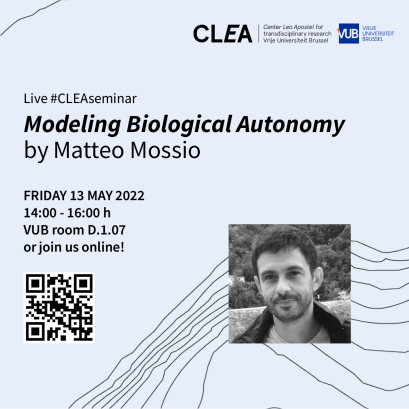In this CLEA seminar, philosopher Matteo Mossio will discuss how the theory of autonomy, which is a model for self-organization, can open up new perspectives for understanding biological phenomena. In particular, he will discuss how the theory of autonomy can shape modeling strategies of biological phenomena by relying on the pivotal concept of 'constraints closure' which is a set of processes that form a closed loop.
Mossio will focus on a particular case study: the regulation of plasma glucose concentrations (glycemia) in mammals. The idea is that, when compared to feedback loops, organizational closure can generate richer descriptions of the processes and constraints at play in the metabolism and regulation of glycaemia, notably by making explicit the different hierarchical orders involved. Mossio will conclude by discussing some challenges that the theory of autonomy has to take up in relation to modeling strategies.
The Speaker
Matteo Mossio is Chargé de recherche (tenured) at the Centre National de la Recherche Scientifique (CNRS), full member of the IHPST, Paris, France. He works mainly in philosophical and theoretical issues related to biological autonomy. He published several articles in international philosophical and scientific journals as well as chapters in collective volumes. In 2015, he published (together with Alvaro Moreno) a full monograph on the theory of autonomy. Matteo Mossio supervises several PhD and Master students, and regularly teaches in the Philosophy Program of the University of Paris 1 Panthéon – Sorbonne.
Practical
The CLEA seminars are taking place simultaneously at the VUB campus in Etterbeek, Brussels, and online (via Zoom) and are open to everyone interested!
When. Friday May 13, 2022 from 14:00 until 16:00h
Where (live). VUB campus Etterbeek, room D.1.07
Online. You can follow online via Zoom
Video
Acknowledgement
This seminar was supported by the John Templeton Foundation through the grant ID61733 The Origins of Goal-Directedness.

